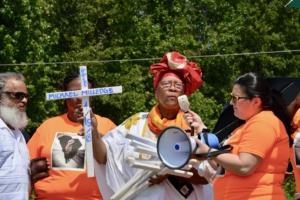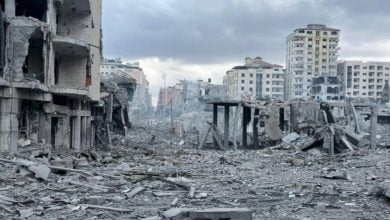On August 25, families of the incarcerated, workers, students and community and religious leaders gathered in support of the ongoing National Prison Strike at the gates of Lee Correctional Institution in South Carolina, the site of a massacre of seven prisoners in April. Many different people from many different communities, organizations and parts of the country attended the rally, but the message was one: “End prison slavery!”
The police, as a testament to their role as foot soldiers for the capitalist ruling class working in tandem with the prisons and courts, turned away several journalists and media trucks which had planned to report on the rally. This was a clear attempt to cover up the widespread community support for the striking prisoners, however unsuccessful it was. Beyond the small crowd gathered at Lee Correctional, millions, if not hundreds of millions, are groaning under the weight of mass incarceration. It will take a lot more than a few media cars turned away to prevent them from looking to the current rebellion inside the prisons with a deep-seated spirit of solidarity and resistance. When the people shouted directly to the police and guards across the field, “Why did you turn them away?”, unsurprisingly, no response was given, only blank stares.
The mother of Damonte Rivera, one of the seven inmates killed in the April riots at Lee, said of the heavy police presence: “Somebody needs to do something, somebody’s gotta step up. The guards ain’t doing their job. Look at all the security now! Where the hell they been at when they killed my son?”
Columbia, SC, poet Tammaka Staley embodied the mood of the people in part of a powerful freestyle poem delivered to the crowd:
“I want this nation rid of evil
I want this nation rid of itself.
How filthy it is, unwashed of all its sacrifice
Air its dirty laundry when making spectacles of my kin.
See, how the men in uniform shoot first, bring bombs to fist fights
Throw a match then hide their sheets in Birmingham, Charleston, Lee county.
Always showing up where they’re not wanted.”

While speakers from various organizations highlighted the 10 demands of the strike, Efia Nwangaza, the director of the Malcolm X Center for Self-Determination and a representative of the Free South Carolina Movement, an organization of prisoners participating and leading in the strike, led people from the crowd in planting crosses with the names of the Lee 7 in the prison yard.
Although the guards will likely have taken down the crosses by the time this article is published, as it was said by Nwangaza, ”When they take them down, they will be haunted by the memory of taking them down. Because, not only do they have to take them down, they have to dispose of them, and each person who participates in that process will forever be reminded of the lives lost.”
As another example of the widespread support for the strike, even exceeding national boundaries, a statement from Palestinian political prisoners was read by Dana Al-Hasan, president of Students for Justice in Palestine at the University of South Carolina. As well as being words of powerful solidarity from some of the most fearless fighters of a people who have been on the receiving end of brutal mass incarceration by the Israeli state, the statement also contained a sober recognition of the roots of the strike movement which resonated deeply with those who have bore the brunt of U.S. mass incarceration for so long:
“The prison strike is a struggle of oppressed and exploited workers, first and foremost, confronting the unmasked brutality of capitalism behind bars. Around the world, prisoners have only protected their human rights and won victories through struggle… Today, prison workers are some of the most exploited workers in the United States, and the same ruling class that profits from the confiscation of Palestinian land and resources and from the bombing of children in Yemen also profits from the forced labor of prisoners. Your struggle is a workers’ struggle that is part of our global conflict against the vicious exploitation that our peoples face today. This struggle inside the prisons highlights the deep connections between racism and capitalism and how the struggle against them both can never be de-linked.”
People everywhere are building up the national, and even international picket line around the strike. Some families of prisoners there said that they had joined the rally when they were turned away from visitation as prisons all around the country are on lockdown because of the strike. Families continue to participate in boycotts of phone lines and commissaries. In Texas, the strikers have already won the cost of phone calls for prisoners being cut by 77 percent. At Lee, some electrical workers doing repairs on the prison even stopped work to go over and speak with some of the protesters about the strike.
While the rally was just one small expression of the anguish felt by the masses of people under the U.S. prison system, it was also an expression of how the prison strike, through the determination of the prisoners, has propelled the movement for the liberation of all people forward. It is instrumental that people all around the country continue to organize in solidarity with the prisoners in order to keep up the momentum needed to build long lasting struggles against mass incarceration.






